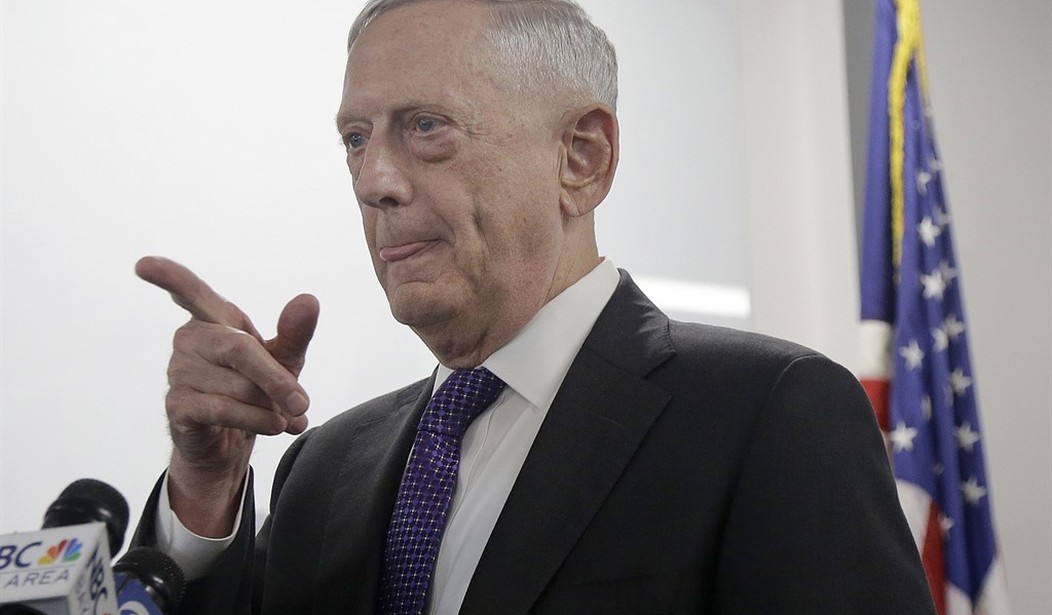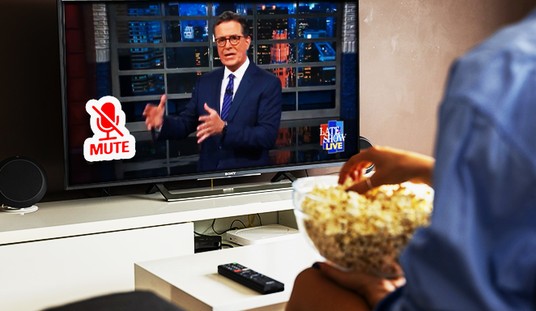Consider this the second sobering thought about pre-emptive strikes on North Korea. At around the same time China warned the US that it would act on any unprovoked attack on the Kim regime, Defense Secretary James Mattis reminded attendees at a California event that military action must remain the last resort. It’s his job to make sure that those options are ready if needed, Mattis said, but right now the matter is in the hands of the diplomats — and that’s where Mattis wants it to stay, too:
While speaking to reporters at the Defense Innovation Unit Experimental(DIUx) event in Mountain View, California, he was asked by a reporter, “Can you talk about the human toll we might see in the event of a nuclear confrontation?”
“My portfolio, my mission, my responsibility is to have military options if you need it,” Mattis responded. “However, right now, Secretary Tillerson, Ambassador Haley, you can see the American effort is diplomatically led, it has diplomatic traction, it is gaining diplomatic results. And I want to stay right there right now. The tragedy of war is well enough known. It does not need another characterization beyond the fact that it would be catastrophic.”
Deviating from the tone of President Trump, who said the U.S. would unleash “fire and fury” upon North Korea, Mattis stressed that the route forward would be diplomatic, and he repeated the importance of the unanimous 15-1 United Nations Security Council vote to impose economic sanctions on North Korea.
“It’s [North Korea’s] aligning the United Nations in very serious sanctions, and I would just tell you that it did not happen by accident,” Mattis said. “That shows where the Trump administration goes in terms of the prioritizing of the threat but also how to deal with it in a diplomatically effective manner.”
But does “fire and fury” amount to a diplomatically effective approach? Actually, yes, argues former Reagan speechwriter Clark Judge. In an essay at US News, Judge says that Trump’s rhetoric is right on target, and helps set the stage for clarity and progress:
Opponents howled when as a candidate the president spoke intemperately about illegal immigration. Yet without a wall or a new law, mainly because of his words, illegal immigration along the southwest border has plummeted by more than 70 percent since he took office.
Europeans had seizures when he let it be known that if they didn’t care enough to contribute as promised to their own defense, they might not be able to count on us alone to do it for them. Except now NATO allies are writing the often-pledged but never delivered 2 percent defense spending into their budgets.
Go to YouTube. Watch Mr. Trump as he delivers his “fire and fury” remark. He looks down twice, apparently at the prepared answer to the question that he and the staff knew was coming. Talking head diplomats may cringe, but after nearly a decade of irresolution in the White House, an American president has sent to the little dictator who has become accustomed to us always backing down a strong, unmistakable message of strength and utter determination.
Here, at least, it is about time.
Diplomacy can take multiple forms, even when two nations do not have direct diplomatic relations. Usually they find ways to set up indirect channels, which work best when kept quiet. For some reason, the Associated Press felt it necessary to identify a back channel between Washington and Pyongyang earlier today in reporting its existence and the scope of their discussions:
Beyond the bluster, the Trump administration has been quietly engaged in back channel diplomacy with North Korea for several months, addressing Americans imprisoned in the communist country and deteriorating relations between the long-time foes, The Associated Press has learned.
It had been known the two sides had discussions to secure the June release of an American university student. But it wasn’t known until now that the contacts have continued, or that they have broached matters other than U.S. detainees.
People familiar with the contacts say the interactions have done nothing thus far to quell tensions over North Korea’s nuclear weapons and missile advances, which are now fueling fears of military confrontation. But they say the behind-the-scenes discussions could still be a foundation for more serious negotiation, including on North Korea’s nuclear weapons, should President Donald Trump and North Korean leader Kim Jong Un put aside the bellicose rhetoric of recent days and endorse a dialogue.
We’ll skip over the identification of the principals for this backchannel, but take note of another dynamic reported by the AP. Backchannels have existed for years between the two nations, but North Korea dropped it recently after the US imposed sanctions directly on Kim Jong-un. Trump, for all his public tough talk, has proven “more flexible”:
Trump, in some ways, has been more flexible in his approach to North Korea than President Barack Obama. While variations of the New York channel have been used on-and-off for years by past administrations, there were no discussions over the last seven months of Obama’s presidency after Pyongyang broke them off in anger over U.S. sanctions imposed on its leader, Kim. Obama made little effort to reopen lines of communication.
The contacts quickly restarted after Trump’s inauguration, other people familiar with the discussions say.
Jaw-jaw is always preferable to war-war, as long as the former isn’t a trap for a surprise version of the latter. Neither side has an element of surprise any longer, so diplomacy is still the best approach. However, we may have to come to terms with North Korean nuclear weapons, and have them come to terms with our permanent presence on the peninsula as long as they demand reunification on their terms.
Update: Maybe Mattis needs to have a talk with his boss:
Pres. Trump: If Kim Jong Un "does anything with respect to Guam" or any U.S. territory or ally "he will truly regret it." pic.twitter.com/LVq9CK44Tq
— ABC News (@ABC) August 11, 2017
This could be a case of good-cop, bad-cop positioning. It is, at the very least, a signal that the US has truly ended its “strategic patience” approach and has opted for the blunt-talk approach instead.








Join the conversation as a VIP Member